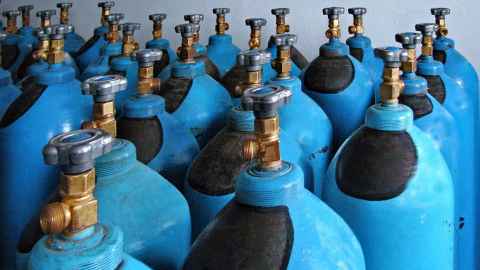No one should die for lack of oxygen
8 May 2021
Opinion: Thousands around the world are dying for lack of oxygen. Dr Stephen Howie looks at the problem, arguing NZ needs to play its role outside its own borders.

Most of us have seen the horrific scenes in India, as hospitals are overwhelmed by Covid-19, and oxygen has run out. People are dying – it couldn’t be plainer. The world is rallying, as it should, but the situation is dire.
What these scenes make clear is that oxygen is a vital, life-saving treatment. It always has been. When a disease causes you to be oxygen-starved (hypoxic, in medical jargon), getting oxygen can save your life. Many of the biggest causes of death and disease in children and adults globally cause hypoxia, including pneumonia (one cause of which is Covid-19), other lung and heart diseases, and a raft of others. The importance of oxygen has just been made painfully obvious by the Covid-19 pandemic.
The problem, and we see this playing out tragically in India, is that having enough oxygen is challenging. So challenging that for years it was in the ‘too-hard basket’ for many low-income countries. In wealthy countries we take such basic treatments for granted. In low-income countries they don’t. But make no mistake, as a health professional, wherever you are, it’s hard to take when someone dies and they didn’t need to. Harder still for the family. And we’ve seen even hospitals in wealthy countries overwhelmed by this pandemic.
So why is oxygen challenging? There are different ways of producing it, storing it, and delivering it. If you walk out the back of many hospitals in wealthy countries, you will find large tanks marked ‘Oxygen’. These get filled by tankers coming from factories that super-cool air into liquid form, decant off the oxygen and store it under high pressure – an expensive, high-energy process. And dangerous too, if you don’t have good systems. Dozens died in Baghdad recently after an oxygen tank exploded.
The same factories can fill oxygen cylinders, a traditional mainstay of oxygen supplies, but they are hard to transport around, they are dangerous if they fall over, and they run out.
Oxygen concentrators and generators work differently. They filter nitrogen out of air to provide medical oxygen. Concentrators usually sit at bedsides and treat one or more people, while larger generators supply pipelines or fill cylinders. Concentrators and generators produce cheap continuous oxygen, but need reliable power to work. All methods need technical backup and contingencies, and these are often lacking in the most challenging settings. And putting all your eggs in one basket is risky – if your one oxygen tank or oxygen generator fails, you are in big trouble, less so if one cylinder or concentrator fails and you have another. There is no one best way. Often a combination of concentrators and backup cylinders makes sense in low-income countries.
But planning is needed. And that is a key point. If Covid-19 has exposed anything it is where planning has been missing in action. Planning to stop the virus getting into the population. Planning to squash it when it does. Planning to treat the sick the virus has hit. And the planning has to be good, or at least good enough. And when it is not good enough we get a catastrophe, like we are seeing in India. No country can afford to be complacent, no country is getting everything right, and this pandemic is unforgiving.
Our neighbour Fiji is facing its own Covid-19 outbreak right now – the virus snuck into the community (we all understand how that can happen), and prompt action has been taken. Neither has Fiji been sitting on its hands previously, assuming everything would be all right. It has been preparing. Fiji has used its partnerships to good effect, including addressing the oxygen challenge. Since 2016, the Fiji Ministry of Health and Medical Services has been partnering with the University of Auckland and Cure Kids to improve access to oxygen.
When the pandemic broke last year, an additional large shipment of oxygen concentrators was expedited through this partnership, subsequently boosted this year by donations from international agencies such as UNICEF and WHO. More than $1 million has been invested by Cure Kids, with substantial input from partners such as Rotary and Australia’s Department of Foreign Affairs and Trade, with a reach to hospitals across Fiji. Investment like this is needed across the region.
Planning and partnership are keys to success. Fiji has done a good job preparing and responding to the Covid-19 threat, and it is an example in our region. As neighbours, we are integrally linked and we must work together, aiming for the best and preparing for the worst. New Zealand has an important role to play: we stand with Fiji as it tackles this outbreak, as we must stand together in our wider Pacific family, and beyond, to meet this challenge together.
Dr Stephen Howie is Associate Professor of Paediatrics, Faculty of Medical and Health Sciences.
This article reflects the opinion of the author and not necessarily the views of the University of Auckland.
Used with permission from Newsroom No one should die for lack of oxygen 8 May 2021.
Media queries
Alison Sims | Research Communications Editor
DDI 09 923 4953
Mob 021 249 0089
Email alison.sims@auckland.ac.nz